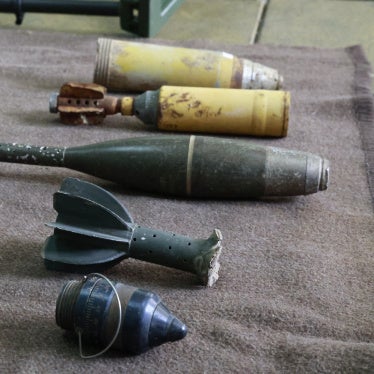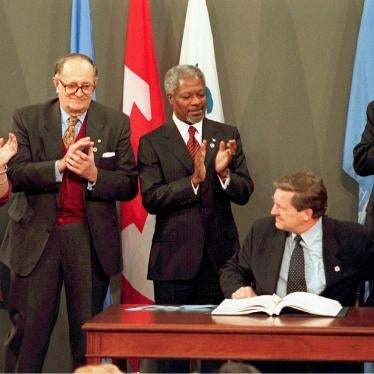The international treaty banning cluster munitions is four years old this month. While Syria’s ongoing use of cluster munitions has kept the issue in the news lately, the reality is that the Convention on Cluster Munitions is making a big difference in saving lives and limbs and curtailing the long-term devastation caused by these weapons.
Launched from the ground or dropped from the air, cluster munitions pose a threat to civilians when they land and long afterward. The weapons disperse submunitions over a wide area and leave explosive bomblets that become de facto landmines, killing and maiming long after the conflict has ended, and hindering post-conflict reconstruction and development.
To date, 113 nations have joined the Convention on Cluster Munitions (84 are states parties and 29 still need to ratify). With great vigor and determination, these nations have been passing national legislation to enforce the ban, destroying their stockpiles, and promoting the convention to nations that have yet to join. There have been no reports or allegations of any states parties engaging in banned activities since the convention became binding international law on August 1, 2010.
Almost two dozen states parties have destroyed a total of more than 1.16 million stockpiled cluster munitions containing nearly 140 million submunitions. At the end of 2013, the United Kingdom, a former producer and user of cluster munitions, completed the destruction of its once massive stockpile of more than 190,000 cluster munitions containing some 38.7 million explosive submunitions. Chile and Denmark recently completed destruction of their stocks, and Germany, France, Japan, and Sweden are among the states parties working to destroy their cluster munitions in advance of the treaty’s eight-year deadline.
Cluster munitions are also being destroyed in great numbers through clearance efforts in states parties that are contaminated from past cluster munitions use, such as Afghanistan, Iraq, Croatia, Laos, and Lebanon. Since the convention became law in 2010, more than 50,000 unexploded submunitions have been cleared annually.
For all the success, some armed forces have continued to use cluster munitions. Syrian government forces have used cluster munitions in 10 of the country’s 14 governorates since June 2012, resulting in many hundreds of civilian casualties. Reports have emerged of new cluster munitions use this year in South Sudan and Ukraine, although it is unclear which armed forces participating in those conflicts are responsible. None of these three governments have joined the treaty.
Despite the instances and allegations of use in a few countries that have not signed, it is clear that the convention is creating a powerful global stigma against cluster munitions, and that it is having an impact even in those countries still outside the convention. More than 50 countries that have not signed the treaty have condemned Syria’s use of cluster munitions in statements and resolutions, including past users such as Israel and the United States.
While it has been silent on cluster munitions use in Syria and has not signed the treaty, Russia has been swift to criticize the use of cluster munitions against civilians in eastern Ukraine on several occasions in the past month. In a May resolution, the United Nations Security Council protested the use of cluster munitions in South Sudan.
Such actions show that even countries that haven’t signed the treaty acknowledge the harm caused to civilians by cluster munitions, and accept the humanitarian rationale for a ban.
A new standard is being set: In the future, only those willing to flout international norms and withstand international condemnation will use cluster munitions. But we aren’t quite there yet. For the Convention on Cluster Munitions to put an end to the suffering caused by these weapons once and for all, all nations should join without delay.










